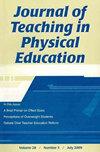冒险教育对儿童身体、心理和社会发展相关健康结果的有效性:一项系统综述
IF 1.8
2区 教育学
Q2 EDUCATION & EDUCATIONAL RESEARCH
引用次数: 2
摘要
目的:本系统综述旨在探讨冒险教育(AE)对0-18岁儿童生理、心理和社会发展的影响。方法:根据系统评价和荟萃分析的首选报告项目(PRISMA 2015)进行综述。文章从2000年至2021年的7个数据库(EMBASE、PubMed、MEDLINE、Web of Science、SPORTDiscus、PsycINFO和Psychology Database)中检索。根据Cochrane随机试验风险工具第2版(RoB 2)检查方法学质量。结果:筛选了18项研究。AE对9 ~ 16岁非健康儿童和3 ~ 7岁非健康儿童的身体发育有促进作用。所有结果均显示AE有积极的心理影响,但在自尊、自我效能和生活质量方面的结果不一致。此外,AE是促进11-17岁非健康和健康儿童以及3-7岁非健康儿童社会发展的一种方法。结论:AE干预对儿童产生了生理、心理和社会效益。本综述中分析的大多数研究集中在9至18岁的不健康和健康儿童身上。只有一项研究涉及3至7岁的不健康儿童。然而,该领域的大多数研究方法质量较弱,因此,应仔细解释目前的证据。未来在声发射干预方面的工作将有助于我们在这一研究领域建立更高程度的准确性。提示:需要更好的研究设计的AE干预。还需要进行研究,以检验AE对健康幼儿的生理、心理和社会发展的有效性。本文章由计算机程序翻译,如有差异,请以英文原文为准。
Effectiveness of Adventure Education on Health Outcomes Related to Physical, Psychological, and Social Development in Children: A Systematic Review
Objective: This systematic review aims to investigate the impact of adventure education (AE) on children’s physical, psychological, and social development (children’s age range: 0–18 years old). Methods: The review was reported based on Preferred Reporting Items for Systematic Review and Meta-analysis (PRISMA 2015). Articles were retrieved from seven databases (EMBASE, PubMed, MEDLINE, Web of Science, SPORTDiscus, PsycINFO, and Psychology Database) from 2000 to 2021. Methodological quality was examined according to Version 2 of the Cochrane risk-of-tool for randomized trials (RoB 2). Results: Eighteen studies were screened. AE was found to contribute to the improvement of physical development in nonhealthy children aged 9 to 16 years and nonhealthy children aged 3 to 7 years. All results showed a positive psychological impact of AE except for inconsistent results for self-esteem, self-efficacy, and quality of life. Moreover, AE was found to be an approach that enhanced social development among nonhealthy and healthy children aged 11–17 years and nonhealthy children aged 3–7 years. Conclusion: AE intervention produces physical, psychological, and social benefits in children. Most studies analyzed in this review focused on 9- to 18-year-old unhealthy and healthy children. Only one study involved 3- to 7-year-old unhealthy children. However, most of the studies in this field have weak methodological quality, and thus, the present evidence should be interpreted carefully. Future work with superior methodology in AE intervention would help us establish a greater degree of accuracy in this area of study. Implications: AE intervention with better study design is needed. Research also needs to be conducted to examine the effectiveness of AE on physical, psychological, and social development in healthy younger children.
求助全文
通过发布文献求助,成功后即可免费获取论文全文。
去求助
来源期刊
CiteScore
4.20
自引率
21.40%
发文量
69
审稿时长
>12 weeks
期刊介绍:
The Journal of Teaching in Physical Education (JTPE) features peer-reviewed research articles based on classroom and laboratory studies, descriptive and survey studies, summary and review articles, and discussion of current topics of interest to physical educators at every level. JTPE is endorsed by the Curriculum and Instruction Academy of the National Association for Sport and Physical Education and the International Association for Physical Education in Higher Education.

 求助内容:
求助内容: 应助结果提醒方式:
应助结果提醒方式:


